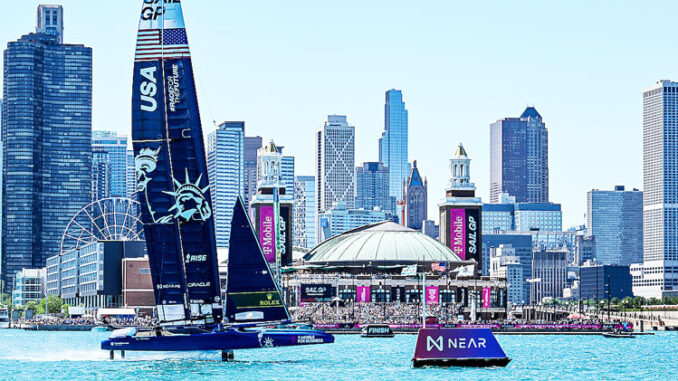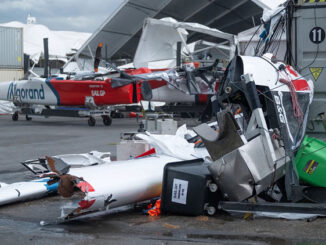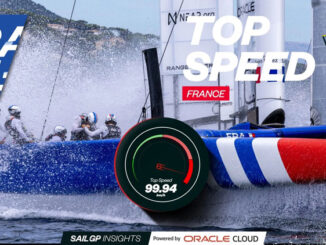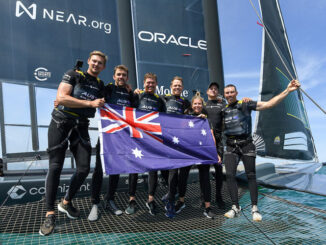
Behind the mic: SailGP commentators dissect what went wrong for the U.S. team in Chicago
6/27/2022 – by Miranda Blazeby, Digital Editor – Poor on-boat communication and the absence of experienced flight controller Rome Kirby were key contributing factors to the disastrous performance of the U.S. team in Chicago, SailGP’s international commentators have said.
Jimmy Spithill’s team failed to perform in front of home crowds on Lake Michigan and ended the weekend with a 8-9-7-7-3 racing record and in 8th place overall. The team struggled in gusty conditions, failing to execute clean starts and consistent manoeuvres.
Commentators Stevie Morrison, Todd Harris, David ‘Freddie’ Carr and Emily Nagel offered possible explanations for the team’s below-par performance which, Carr said, was ‘tough to watch’.
Morrison shrugged off the suggestion that the team buckled under home pressure, pointing to their ‘pretty average’ performance in Bermuda last month, which saw them finish fifth on the leaderboard.
He highlighted the addition of new flight controller Hans Henken, who first raced in the role in Bermuda. Henken now shares the role with SailGP veteran Rome Kirby, who served as flight controller throughout Season 2 and previously led the U.S. team as Driver in Season 1. Kirby, who is injured, remains on the team roster for Season 3.
Morrison described the absence of Kirby as ‘a huge loss,’ adding – ‘you can’t lose someone like Rome and not expect to take a step backwards.”
The flight controller role is one of three core positions on the boat, alongside the wing trimmer and Driver. “Flight controller a very difficult job to just jump in and learn straight away,” said Nagel, “especially when you’re jumping into a home event where there’s pressure on your shoulders, with short course racing and fairly tricky conditions.”
However, the commentators also highlighted disjointed on board communication as a weakness of the U.S. team, especially between grinder and tactician Andrew Campbell and Driver Spithill.
However, the commentators also highlighted disjointed on board communication as a weakness of the U.S. team, especially between grinder and tactician Andrew Campbell and Driver Spithill.
Morrison questioned Campbell’s ability to effectively double in both roles. “They’ve tried to set up the U.S. team so that Jimmy isn’t the tactician,” he said. “Now with nine boats on the course, there’s less space and less time so I wonder if there’s enough processing time for communication between Andrew and Jimmy on those key decisions.”
Nagel also questioned the delegation of tactical decisions to a grinder, arguing that the U.S. boat is ‘not utilising the sixth sailor position at all’.
“Andrew Campbell is a great tactician with heaps of experience, but it’s virtually impossible to be grinding as much as you need to be and still have your head out of the boat,” she said. “The sixth person is in a prime spot to be able to look around and make decisions.”
Harris agreed that ‘there might be a communication problem on the boat’.
“They just don’t seem to be as in sync or the well-oiled machine that Australia are,” he said. “The communication is not as fluid. In the Australian team, they all know what the plan is and they’re all in perfect sync.”
But, Carr was optimistic of the team’s ability to bounce back from Chicago.
“They’ve got all the tools in their arsenal and they’ve got the same group of people that they had last year,” he said. However, he warned that some ‘ruthless’ decisions may lie ahead for Driver Spithill.
“I’ll be interested to see if Rome flies the boat in Plymouth for the consistency that saw them finish third last season or whether they’ll persist with Henken,” he said. “That’s a big call for Spithill but that’s what sport’s about – it’s ruthless”.


